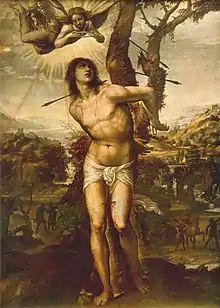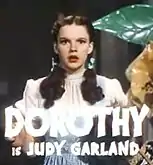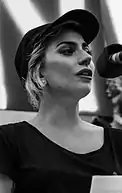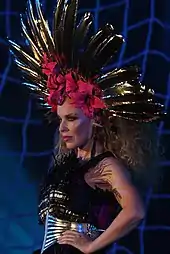Gay icon
A gay icon is a public figure who is regarded as a cultural icon of some members of the LGBT community.
The most widely recognized gay icons are often celebrities who garnered large LGBT fanbases, such as Judy Garland, Madonna, Diana Ross, Britney Spears, Kate Bush, Janet Jackson, Beyoncé, Cher, and Lady Gaga. However, the term is also applied to politicians, authors, and other historical figures deemed relatable to LGBT causes.
Many gay icons are celebrities in the entertainment industry, but the label has also been applied to figures in politics, history, sports, literature, and other mediums. Prominent entertainers considered to be gay icons often incorporate themes of acceptance, self-love, and sexuality in their work. Gay icons of all orientations have acknowledged the role that their gay fans have played in their success.
Historical figures
Sappho of Lesbos
Sappho of Lesbos was an Archaic Greek poet known for composing sentimental lyrics about women. Perceived homoerotism in her poems have led to her becoming a symbol for lesbianism,[1] with her name and home island inspiring the terms sapphic and lesbian respectively. Her sexuality, and the themes in her poetry have been extensively discussed and reinterpreted by scholars.[2]

Saint Sebastian
The 3rd century Christian martyr Saint Sebastian is one of the earliest known gay icons,[3] due to his depiction in artwork as a beautiful, agonied young man.[4] Historian Richard A. Kaye states that "Contemporary gay men have seen in Sebastian at once a stunning advertisement for homosexual desire (indeed, a homoerotic ideal), and a prototypical portrait of a tortured closet case."[5]
In the 1890s, Irish poet Oscar Wilde, himself also called a gay icon,[6] was incarcerated and exiled for his sexuality, and adopted the pseudonym "Sebastian Melmoth" after the saint.[7] Gay playwright Tennessee Williams used the saint's name for the martyred character Sebastian in his 1957 play, Suddenly Last Summer.[8]
Marie Antoinette
Prior to the French Revolution, opponents of the French monarchy regularly circulated pornographic propaganda alleging that Marie Antoinette was engaged in a lesbian relationship with the Princesse de Lamballe. While the rumors of Antoinette's sexuality were unfounded, they led to her being interpreted as an early lesbian icon in works by gay authors, such as Radclyffe Hall's The Well of Loneliness (1928) and Jean Genet's The Maids (1947).[9]
Selected modern celebrities
Mariah Carey
.jpg.webp)
Mariah Carey has demonstrated allyship since the early beginnings of her career. She has shown her love for her LGBTQ+ fans numerous times, including a 2003 performance at G-A-Y in London.[13] Furthermore, Carey also won a GLAAD award for Allyship.[14]
Kate Bush
Kate Bush has been cited as an influence by respected artists like Sir Elton John, who is openly gay and credits Bush's music with helping him to overcome his alcoholism. Fellow gay icon Cher has also expressed admiration of Bush's work. Her debut single "Wuthering Heights" topped the charts and became a global success. The music video for the song in which she dances in the moors in a red dress has become iconic among the LGBTQ community. One of her less influential albums, Lionheart (1978), featured a song titled "Kashka From Baghdad", which regaled to the listener the tale of a gay couple living together in sin, which was quite revolutionary for its time.[15] Since 2016, Kate Bush fans have gathered in locations all over the world and taken to recreate Bush's "Wuthering Heights" video in an event dubbed The Most Wuthering Heights Day Ever. Men and women in attendance to the event don red dresses or red in general and recreate the choreography observed in the video as a tribute. Bush, who has seen a clip of one of the events, described the tribute by her fans as "very touching and sweet".[16]
Madonna
_(cropped).jpg.webp)
Pop musician Madonna has become a preeminent gay icon.[17][18][19] The Advocate's Steve Gdula commented that "back in the 1980s and even the early 1990s, the release of a new Madonna video or single was akin to a national holiday, at least among her gay fans."[19] Gdula also stated that during this period, concurrent with the rise of the AIDS epidemic, "when other artists tried to distance themselves from the very audience that helped their stars to rise, Madonna only turned the light back on her gay fans and made it burn all the brighter."[19]
Janet Jackson

Janet Jackson garnered a substantial LGBT following during the 1990s with her sixth studio album The Velvet Rope (1997).[20][21][22] The album was honored by the National Black Lesbian and Gay Leadership Forum and received the award for Outstanding Music Album at the 9th Annual GLAAD Media Awards in 1998 for its songs that dealt with sexual orientation and homophobia.[23] On April 26, 2008, she received the Vanguard Award—a media award from the Gay & Lesbian Alliance Against Defamation—to honor her work in the entertainment industry in promoting equality for LGBT people.[23] GLAAD President Neil G. Giuliano commented, "Ms. Jackson has a tremendous following inside the LGBT community and out, and having her stand with us against the defamation that LGBT people still face in our country is extremely significant."[23][24]
Ellen DeGeneres
Ellen DeGeneres is considered to be a gay icon for coming out publicly in a time when American culture was not as accepting, facing setbacks to her career and persevering to have an extremely successful daytime talk show.[25]
Lady Gaga
Lady Gaga, who herself is bisexual, fought as an LGBT rights activist from the beginning of her career and has a large LGBT following.[26] She is often referred as one of the biggest contemporary gay icons and fought against LGBT-related phobias, for marriage and adoption equality, the repeal of the Don't Ask Don't Tell law, the protection of transgender people.[26][27][28][29][30]
Katy Perry
Out described Katy Perry as a gay icon.[31] Perry dedicated the music video for Firework to the It Gets Better Project.[32] Perry was additionally awarded the National Equality Award by the Human Rights Campaign.[33]
Judy Garland

Late singer and actress Judy Garland was immensely popular among gay men due to her camp sensibilities, and is considered "the quintessential pre-Stonewall gay icon".[34]
In the 1950s, the phrase "friend of Dorothy" became used as a slang term for homosexuals. This term is attributed both to well-known author and fellow gay icon Dorothy Parker, and to Garland's prominent role as Dorothy Gale in The Wizard of Oz.[35]
Diana, Princess of Wales
Highly regarded by the LGBT community due to her work with gay men suffering from AIDS,[36][37] Diana, Princess of Wales, is considered to be a gay icon.[38][39] The hardships she faced during her life within the British royal family and her struggles with bulimia have been cited as factors to which members of the LGBT community can mostly connect.[40][41] Writing for Them, David Levesley described Diana as "a symbol of the familial oppression many queer people know all too well," and added that "[queer people] admire her for how long she lasted in the face of a shitty situation. Is there anything more queer than a fabulous woman trapped in a bleak household?"[40] James Greig from Vice also held a similar viewpoint, stating that "her status as a tragic diva aside, it's undeniable that Diana made real, material changes to the lives of LGBT people – particularly through the work she did around AIDS."[41] In an article for Newsweek, Desmond O'Connor wrote that Diana's work with dying HIV+ gay men was crucial for reminding "the people of Great Britain that their 'untouchable' sons deserved to be loved."[42]
In 2009, a panel including Sir Ian McKellen and Alan Hollinghurst chose Diana's portrait to be shown in the Gay Icons exhibition at the National Portrait Gallery, London.[36] In October 2017, the Attitude magazine honoured Diana with its Legacy Award for her HIV/AIDS work. Prince Harry accepted the award on behalf of his mother.[43][44]
Kylie Minogue
Kylie Minogue, known for her disco-infused dance music and camp style, is held in high esteem by her gays fans.[45][46][47][48] She remarks that her gay fans have been with her through thick and thin, yet was never specifically marketed to a gay audience early in her career. Singer songwriter Rufus Wainwright described Kylie as 'the gay shorthand for joy'. She has performed at the Sydney Gay and Lesbian Mardi Gras Party in 1994, 1998 and 2012.
Fictional characters
Wonder Woman
Responses

Many celebrities have responded positively to being regarded as gay icons, several noting the loyalty of their gay fans. Eartha Kitt and Cher have credited gay fans with keeping them going at times when their careers had faltered.[52]

Kylie Minogue has acknowledged the perception of herself as a gay icon and has performed at such events as the Sydney Gay and Lesbian Mardi Gras. Asked to explain the reason for her large gay fanbase, Minogue replied, "It's always difficult for me to give the definitive answer because I don't have it. My gay audience has been with me from the beginning ... they kind of adopted me." She noted that she differed from many gay icons who were seen as tragic figures, with the comment, "I've had a lot of tragic hairdos and outfits. I think that makes up for it!"[53]
Lady Gaga has acknowledged and credited her gay following for launching then supporting her career stating, among other examples, "When I started in the mainstream it was the gays that lifted me up", and that "because of the gay community I'm where I am today." As a way to thank her gay audience for allowing her to perform her first album in gay clubs before she was invited to perform at straight ones, she often debuted her new albums at gay clubs. Along her career, she also dedicated a MuchMusic Video Award win, as well as her Alejandro music video, to gay people, frequently praised her gay entourage for the positive impact they had on her life and often gave a place to different queer crowds in her songs, performances, music videos as well as in the visuals of her make up line. Lady Gaga is known for her fights as an LGBT activist and attended numerous LGBT events such as Prides and Stonewall day.[54][55][56][57][58][59][60]
Madonna has acknowledged and embraced her gay following throughout her career, even making several references to the gay community in her songs or performances, and performed at several gay clubs. She has declared in interviews that some of her best friends are gay and that she adores gay people and refers to herself as "the biggest gay icon of all times."[61] She also has been quoted in television interviews in the early 1990s as declaring the "big problem in America at the time was homophobia."
Geri Halliwell has consistently acknowledged and accepted her status as a gay icon throughout her career as both a solo artist and member of the Spice Girls, describing a "kinship" with the gay community and her love and respect for her LGBTQ fans.[62][63]
See also
- Queer art
- New Queer Cinema
- Lists of LGBT people
- Straight ally
References
- Rayor, Diane; Lardinois, André (2014). Sappho: A New Translation of the Complete Works. Cambridge: Cambridge University Press. pp. 2–9. ISBN 978-1-107-02359-8.
- Mendelsohn, Daniel (8 March 2015). "How Gay Was Sappho?". The New Yorker. Retrieved 2020-12-21.
- "Subjects of the Visual Arts: St. Sebastian". glbtq.com. 2002. Archived from the original on September 1, 2007. Retrieved August 1, 2007.
- "Arrows of desire: How did St Sebastian become an enduring, homo-erotic". The Independent. 2011-10-23. Retrieved 2020-12-20.
- Kaye, Richard A. (1996). "Losing His Religion: Saint Sebastian as Contemporary Gay Martyr". Outlooks: Lesbian and Gay Sexualities and Visual Cultures. Peter Horne and Reina Lewis, Eds. New York: Routledge. 86: 105. doi:10.4324/9780203432433_chapter_five.
- AnOther (2016-09-02). "How Oscar Wilde Paved the Way for Gay Rights in the Arts". AnOther. Retrieved 2020-12-20.
- Wilde, Oscar (2000). The complete letters of Oscar Wilde. Holland, Merlin., Hart-Davis, Rupert, 1907-1999. (1st ed.). New York: Henry Holt. ISBN 0-8050-5915-6. OCLC 45172929.
- "Tiny Rep presents Suddenly, Last Summer" (PDF). Archived from the original (PDF) on September 28, 2007. Retrieved August 1, 2007.
- Fraser, Antonia (2001). Marie Antoinette: The Journey. New York: Anchor. p. 449. ISBN 0-385-48949-8.
- Arestis, Stefan (2021-03-10). "Top 25 gay icons of all time". Nomadic Boys. Retrieved 2021-06-12.
- Krause, Karl (May 20, 2021). "Top 13 Gay Icons of the LGBTQ+ Community". coupleofmen.com. Retrieved February 2, 2022.
- Lacroix, Marion Raynaud (2018-10-11). "what we can take away from gay icons". i-D. Retrieved 2021-06-12.
- "Mariah at G-A-Y club".
- "Mariah Carey".
- Kelleher, Patrick (2021-07-30). "Kate Bush was singing about anal sex and 'vaseline' in the 70s – the BBC wasn't having any of it". Pink News. Retrieved 2022-01-17.
- "'In conversation with Kate Bush". Macleans. 28 November 2016. Retrieved 17 January 2022.
- Cross, Mary (2004). Madonna: A Biography. Canongate U.S. ISBN 0-313-33811-6.
- Bowman, Edith (May 26, 2007). "BBC World Visionaries: Madonna Vs. Mozart". BBC News. Archived from the original on May 25, 2008. Retrieved May 12, 2008.
In 2000, Guinness World Records listed Madonna as the most successful female recording artist of all time.
- Gdula, Steve (November 11, 2005). "Happy Madonna day!". Archived from the original on November 19, 2006. Retrieved July 9, 2008.
- Goldberg, M. (May 2, 1991). "The Jacksons score big". Rolling Stone. p. 32. ISSN 0035-791X.
- "Janet Jackson Hits Big; $80 Million Record Deal". Newsday. January 13, 1996. pp. A02.
- McCormick, Neil (October 18, 1997). "The Arts: Give her enough rope... Reviews Rock CDs". The Daily Telegraph. p. 11.
- McCarthy, Marc (April 1, 2008). "Janet Jackson to be Honored at 19th Annual GLAAD Media Awards in Los Angeles". GLAAD. Archived from the original on April 9, 2008. Retrieved April 1, 2008.
- "La Toya Jackson Learns Life's Lessons". gaywired.com. June 2005. Archived from the original on 2005-10-23. Retrieved December 21, 2007.
- Daniels, Karu F. (May 18, 2021). "Wanda Sykes gives Ellen DeGeneres props for being a gay icon". New York Daily News. Retrieved 2022-02-16.
- "lady-gaga: 8 times she earned her gay icon title". Billboard. 22 June 2017.
- "how to become a gay icon". 11 October 2018.
- Manders, Hayden. "Gay Icons — Queer Thought Celebrity". www.refinery29.com. Retrieved 2021-07-05.
- "Lady Gaga's new album Chromatica just dropped – here's 13 other times she proved she's the ultimate LGBTQ+ hero". www.indy100.com. 2020-05-29. Retrieved 2021-07-05.
- Zak, Dan (2009-10-12). "Lady Gaga, Already a Gay Icon, Shows She's an Activist Too". The Washington Post. ISSN 0190-8286. Retrieved 2021-07-05.
- Henderson, Taylor (2021-12-16). "Katy Perry Knows She Helped Fans Explore Their Sexuality". www.out.com. Retrieved 2022-04-23.
- Vena, Jocelyn (2010-10-28). "Katy Perry Dedicates 'Firework' Video To 'It Gets Better' Project". MTV News. Retrieved 2022-04-23.
- Kilpatrick, Ryan (2017-03-10). "Katy Perry Champions LGBTQ Equality at Human-Rights Gala". Time. Retrieved 2022-04-23.
- Bronski, Michael (1984). Culture Clash: The Making of Gay Sensibility. South End Press. p. 104. ISBN 0-89608-217-2.
- Cage, Ken; Evans, Moyra (2003). Gayle: The Language of Kinks and Queens, A History and Dictionary of Gay Language in South Africa. Jacana Media. p. 10. ISBN 1-919931-49-X.
- "Kate Middleton is an 'icon' to lesbian people, says Tipping the Velvet author Sarah Waters". The Telegraph. London. 21 April 2011. Archived from the original on 24 April 2011. Retrieved 9 December 2020.
- Wray, Meghan (27 June 2020). "Remembering how Princess Diana gave back to the LGBTQ community". Hello! Canada. Retrieved 28 April 2021.
- Gage, Simon; Richards, Lisa; Wilmot, Howard; George, Boy (2002). Queer. Thunder's Mouth Press. p. 17. ISBN 1-56025-377-0.
- Baker-Jordan, Skylar (31 August 2017). "Princess Diana desperately wanted to just be herself – that's why she will always be a gay icon". The Independent. Retrieved 28 April 2021.
- Levesley, David (19 May 2018). "Why Princess Diana Is An Enduring Queer Icon". Them. Retrieved 28 April 2021.
- Greig, James (20 February 2019). "What Princess Diana Means to Queer People in 2019". Vice. Retrieved 28 April 2021.
- O'Connor, Desmond (29 August 2017). "How Princess Diana Became a Gay Icon, 'Facing the World With a Defiant Smile'". Newsweek. Retrieved 28 April 2021.
- "Prince Harry calls for regular HIV and Aids testing". BBC News. 13 October 2017. Archived from the original on 21 October 2017. Retrieved 21 October 2017.
- "Prince Harry accepts Attitude Legacy Award for Princess Diana's groundbreaking Aids activism". Attitude. Archived from the original on 22 October 2017. Retrieved 21 October 2017.
- https://www.nfsa.gov.au/collection/curated/kylie-becoming-gay-icon
- "Kylie Minogue Finally Settles the Debate on the Definitive Gay Anthem: Here's Her Pick". Billboard.
- "GLAAD Blog".
- "The enduring gay appeal of Kylie Minogue". 28 May 2021.
- Gramuglia, Anthony (May 18, 2020). "Fabulous Secret Powers: Masters of the Universe's LGBTQ Fandom". Comic Book Resources. Valnet Inc. Archived from the original on March 18, 2021. Retrieved July 27, 2021.
- Huls, Alexander (September 21, 2020). "Why He-Man Is a Gay Icon". Men's Health. Hearst Communications. Archived from the original on May 15, 2021. Retrieved July 25, 2021.
- Collins, Hannah (October 10, 2017). "Queer Heroes: 15 Superheroes Who Are Gay Icons". Comic Book Resources. Valnet Inc. Archived from the original on January 25, 2021. Retrieved July 27, 2021.
- Rutledge, Leigh W. (2003). The Gay Book of Lists, 3rd Edition. Los Angeles, CA: Alyson Publications. pp. 87–88. ISBN 1-55583-740-9.
- Ives, Brian; Bottomley, C. (February 24, 2004). "Kylie Minogue: Disco's Thin White Dame". VH1.com. Retrieved January 21, 2007.
- Nichols, James Michael (2017-03-25). "Lady Gaga: Gay Men 'Helped Me Become A Woman'". HuffPost. Retrieved 2019-12-24.
- "Lady Gaga: 'I Really Wouldn't Be Here Without the Gay Community'". pride.com. 2018-09-10. Retrieved 2019-12-24.
- "Why gays love Gaga". www.nationthailand.com. 24 May 2012.
- "The Lady Is a Vamp". out.com. 2017-03-28. Retrieved 2019-12-24.
- Mandell, Andrea. "Lady Gaga and her stylist have a 4 a.m. kind of friendship". USA TODAY. Retrieved 2019-12-24.
- "12 Times Lady Gaga Showed Love for the LGBTQ Community". Billboard. 20 September 2018. Retrieved 2019-12-24.
- "Lady Gaga Honored For LGBT Work". Look to the Stars. 2011-03-23. Retrieved 2019-12-24.
- "Madonna: 'I hope I'm still a gay icon'". Gay.com. October 26, 2005. Archived from the original on October 28, 2005. Retrieved August 1, 2007.
- Crowley, Patrick (19 June 2017). "Geri Halliwell Premieres George Michael Tribute, Talks 'Spice World' & LGBTQ Fanbase". Billboard. Retrieved 10 January 2021.
- "Attitude's Honourary Gay Award: Geri Horner". Attitude. 10 October 2016. Retrieved 10 January 2021.
Books
- Gay Icons: The (Mostly) Female Entertainers Gay Men Love, Georges-Claude Guilbert (2018). ISBN 978-1-4766-7433-9
- The Culture of Queers, Richard Dyer (2002). ISBN 0-415-22376-8
- Frightening the Horses: Gay Icons of the Cinema, Eric Braun (2002). ISBN 1-903111-10-2
- 20th Century Icons-Gay, Graham Norton (2001). ISBN 1-899791-77-9
- Gay histories and cultures, George E. Haggerty (2000). ISBN 0-8153-1880-4
External links
- GLBT Historical Society
- Christina up close
- Sophie Morris. From the tragic to the bland // New Statesman, August 1, 2005
- "Pink doesn't mean fluffy" John Howard. The Independent, (UK), August 4, 2005
- French Gay Icons: Ysa Ferrer